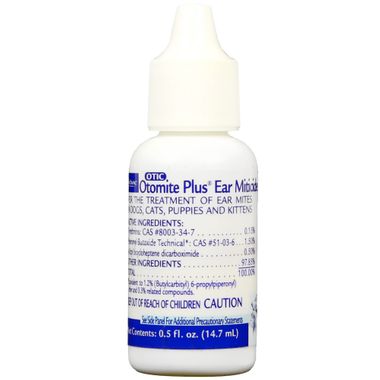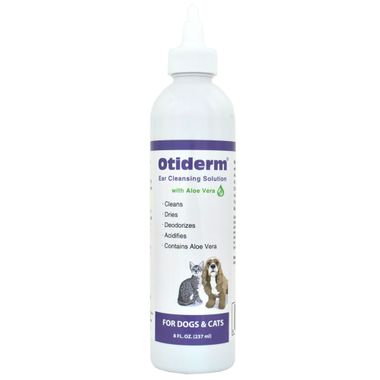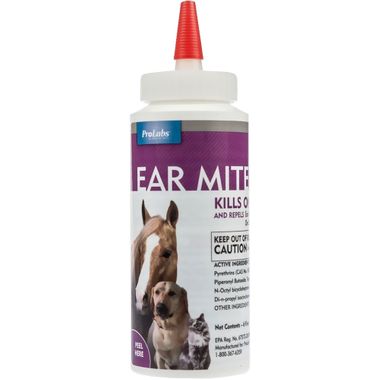Cat Ear Mites: Causes, Symptoms, and How to Treat Them (2020 Update)
Ear mites are a common issue in pets, but especially in cats. They make their home in your kittyís ears causing them lots of irritation and discomfort. The irritation is usually mild. But, if left untreated, ear mites can lead to much more serious infections. In this article, weíre going to break down what ear mites in cats are, what causes them, the symptoms, treatment options, and more. By the end, you should be fully prepared to identify and treat ear mites.
What Are Ear Mites?
Cat ear mites are tiny parasites that like to live in the outer part of the ear and internal
canal.
The most common form in cats is otodectes cynotis. This eight-legged mite is found
throughout the world and is common in other animals as well. The mites are
non-burrowing, which means they can be seen by the naked eye, although barely.
However, the most tell-tale sign of ear mite presence is the dark-colored discharge they
leave behind.

What Causes Ear Mites in Cats?
Ear mites are usually contracted by exposure to them.
Once exposed through another animal, contaminated area, or an object containing the mites, the mites then transfer to the cat and multiply, making them highly contagious. While
causing discomfort, they are also one of the most common causes of feline ear infections.
Ear mites cannot infect humans, and usually die within a few weeks of living on a human host.
Diagnosing Ear Mites
This infection can often be diagnosed with a physical inspection. You will either see the mites themselves, the redness, or the dark discharge they leave behind.
However, even if you believe your cat has ear mites, it is still imperative that you
take him or her to the vet and get a professional opinion. They will perform lab tests
to make sure it is actually ear mites and they will check for other diseases as well
that may have arisen as a result, like skin and yeast infections.
The Symptoms of Cat Ear Mites
- Frantic scratching of ears
- Head shaking
- Dark discharge or residue around the ear
- Odor
- Ear tilt down or to the side
- Ear hematomas
- Ear wax buildup
- Inflammation
- Obstruction of the ear canal with dark discharge
- Hair loss around the ears
The Dangers of Ear Mites
Ear mites themselves typically only cause itching and irritation, but they can lead to more serious bacterial or fungal infections. Itching and scratching can lead to open sores. These sores are the perfect avenue for more serious infections to take hold. The discharge that ear mites leave behind can also become so prevalent that it partially or completely blocks the catís ear canal, leading to hearing problems. Because of these issues, itís important that ear mites are treated as soon as possible.
Which Cat Breeds Are Most Prone?
Ear mites can affect any cat, no matter their breed.
However, outdoor cats and kittens are more likely to make contact with ear mites. Therefore, it is most common in cats that are frequently outdoors.
The Best Treatment Options for Cat Ear Mites
If you believe your cat has ear mites, the first thing you should do is take him or her to the vet. Their, your vet can precisely diagnose whatís going on and prescribe anti-parasitic and/or
anti-inflammatory medication.
They can also help clean out your kittyís ear of any debris buildup.
The following solutions can also help cleanse your catís ear and keep it clean. (They are excellent preventative measures, but might not be alternatives to prescription medication):
| Product | Description | |
|---|---|---|
 Zymox Otic w/ Hydrocortisone 1.0% (1.25oz) Zymox Otic w/ Hydrocortisone 1.0% (1.25oz) |
Zymox Otic is the best ear cleanser on the market. It works to clear ears of debri, relieve inflammation, and protect against harmful bacteria, fungus and yeasts that cause ear infections. They use the LP3 Enzyme System with enzymes that are naturally occurring. They have powerful antimicrobial properties, and do not contain antibiotics (for pets with sensitive ears). Zymox is safe to use on cats, dogs, and small pets. | |
 Otomite Plus Ear Mite Treatment (14.7 ml) by Virbac Otomite Plus Ear Mite Treatment (14.7 ml) by Virbac |
Otomite is an excellent solution for eliminating ear mites without irritation. It contains the highest levels of synergized pyrethrins available (an insecticide that targets the nervous system of insects) and can be used on cats of any age. | |
 Otidermģ Ear Cleanser for Dogs & Cats (8 fl oz) Otidermģ Ear Cleanser for Dogs & Cats (8 fl oz) |
Otiderm is great for pets with sensitive ears, as it is specifically designed to deodorize and gently clean ears. At the same time, it also acidifies the petís ear canal and dries on its own. Clean and dry is the ideal environment for healthy ears. Itís an anti-irritant forumal with neutral pH and aloe vera, and it can be used safely in conjunction with ear medications. | |
 ProLabs Ear Mite Killer Lotion (6 oz) ProLabs Ear Mite Killer Lotion (6 oz) |
Enisyl-F Lysine Treats are a palatable source of L-Lysine. Supplemental administration of L-Lysine has been shown to reduce the severity and duration of feline herpes virus infections. |
Are There Home Remedies?
Yes, there are a few home remedies for treating feline ear mites. While they arenít as recommended as prescription medication or ear cleansing products, they can work.
You can learn more here.
How to Prevent Mites from Coming Back
Mites struggle to live in clean, dry environments, so the best preventative measure is to clean your catís ears on a regular basis and make sure they are free of moisture.
To Wrap It Up
Ear mites are pesky creatures. They can cause lots of irritation for your cat, and they can lead to worse infections if not taken care of.
Luckily, you now know how to treat ear mites in your cat.




